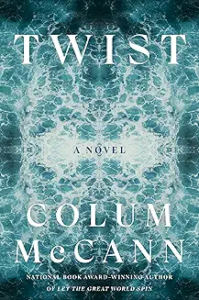Twist by Colum McCann 2025
McCann, the author of three excellent novels that I have read,” TransAtlantic“, “Let the Great World Spin”, and “Apeirogon“, has written another fine piece of fiction.
The title is a play on words with ‘twist’ referring to the wires in the undersea cables that carry the internet’s light speed signals around the world on twisted glass fibers while also referring to the twisted mind that we watch develop as the main character John Conway moves toward madness over the course of the story.
The action is narrated by Anthony Fennell, an Irish journalist who takes on the assignment of writing a long piece of non-fiction for an on-line magazine, the topic being the undersea cables that carry the internet’s information around the world and the repair ships which fix these cables when a break occurs. He joins the repair ship in Capetown, South Africa after meeting Conway, the mission director who introduces Fennell to his lover, a Black actress named Zenele and her two children. A huge rainstorm (read CLIMATE CHANGE!) turns the Congo River into a raging, destructive force which tears the cable off the coast of Ghana, and off Fennell, Conway, and the crew go to find the loose ends and fix them. Life on the ship is dull and boring until the cable is found. We meet the crew and gain insight into Conway’s world and life, but none of this prepares us for his disappearance from the ship. Did he go overboard intentionlly and drown or did he just choose to disappear?
I won’t give any further details to avoid spoiling the read, but it’s a good ending recalling Joseph Conrad’s “The Heart of Darkness” with Conway playing the role of Kurtz and Fennell playing the narrator role of Marlow. The parallels are striking. In both instances we see how the thin veneer of civilization is easily peeled off revealing a vulnerable mind threatened by forces that go beyond the everyday, in Kurtz’s case the primitive and in Conway’s case modern technology.
McCann is a masterful writer who wields language into vivid images about time, memory, and the unknowability of people to both themselves and to others. He knows how to tell a story and crafts fine language to do so. Here are some examples: “...all memory is, of course, conjecture, a piecing together of the mosaic, and not always to be trusted, but even if it’s not exactly what I thought at the moment, it is an honest portrait of how I’m sure I felt…..There is not much in our lives that isn’t part of a misdirect. Nobody lands on an absolute truth. Most of it is sinewed together with lies. We deceive ourselves. Life unravels. Prssures accumulate. Another world in our world. That silent steam builds up. It seeps in the edges and expands until we crack…..Few of the stories we have inside ourselves ever get properly told…..It is, I suppose, the job of the storyteller to rearrange the scattered pieces of a story so that they conform to some sort of coherence. Between fact and fiction lie memory and imagination. Within memory and imgaination lies our desire to capture at least some essence of the truth, which is, at best, messy”. And then there’s this wonderful sentence quoting Pascal, the 17th C. mathematician and physicist about whom McCann writes,“What was it Pascal had written? All of our problems stem from our inability to sit quietly in a room alone.”
I love that. McCann has succeeded once again in writing a wonderful story in a wonderful way.



